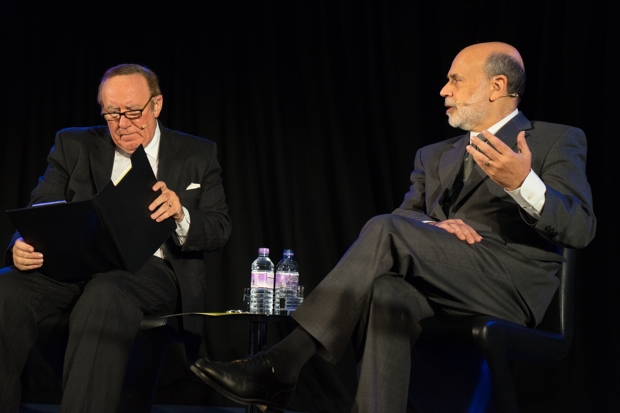Last night, The Spectator hosted a discussion between Ben Bernanke and Andrew Neil about the financial crisis and its aftermath. Mr Bernanke, who was chairman of the US Federal Reserve during the crash and Great Recession, spoke about a number of different topics.
Initially, conversation focussed on the buildup to the crash. ‘What made the crisis so bad at the time was the panic it triggered,’ said Mr Bernanke. He suggested that while subprime mortgages were actually a relatively small asset class, their links to so many other types of credit led to panic.
Mr Bernanke then went onto describe the relationship between the Federal Reserve and Washington – suggesting that while he tried to ‘maintain a collegial feel’ throughout the crisis, both within the Federal Reserve and beyond, it wasn’t always easy.
The discussion then moved onto the early days of the crisis – and whether the Federal Reserve could have done more to save Lehman Brothers. ‘We couldn’t save Lehman,’ said Mr Bernanke, ‘but we did try to spread the collateral round wherever we could.’ He also suggested that he knew the response to the bailout was going to be bad, from both ends of the political spectrum.
This led onto a discussion about the political implications of the bailout. Having previously called himself a republican, Mr Bernanke then suggested that the spectrum had shifted, and had left him in a more central position, which he didn’t feel was represented by either party. He argued that the lack of crossover between the two political parties had caused a huge amount of damage during the crash, and that he would have liked to have seen more fiscal support from the legislature. ‘Monetary policy has had to do too much of the heavy lifting,’ he said. Mr Bernanke also touched on the Eurozone crisis, and suggested that the US and UK economies had recovered much faster than the Eurozone’s, in part due to the monetary policy that was introduced. As for Greece, Mr Bernanke said that its membership of the Eurozone was more political than economic, and so long as this political will continues, it will probably remain. Looking to the future, Mr Bernanke’s suggested that most indicators don’t seem to suggest we are near another recession, but that ’emerging markets are the most meaningful financial risk at the moment.’ Finally, when asked as to why Gordon Brown – who supposedly helped save the world during the banking crisis – only gets one mention in his new book The Courage to Act, Mr Bernanke suggested it was because he introduced measures so rapidly in the UK that he only needed a brief mention. This event was held in association with Seven Investment Management





Comments